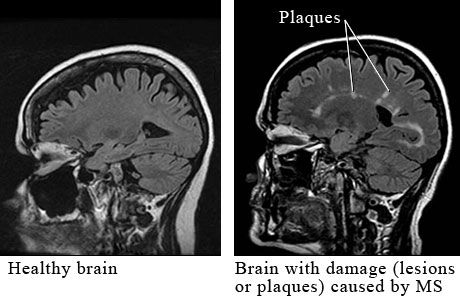Medical expert of the article
New publications
Multiple sclerosis can be cured.
Last reviewed: 01.07.2025

All iLive content is medically reviewed or fact checked to ensure as much factual accuracy as possible.
We have strict sourcing guidelines and only link to reputable media sites, academic research institutions and, whenever possible, medically peer reviewed studies. Note that the numbers in parentheses ([1], [2], etc.) are clickable links to these studies.
If you feel that any of our content is inaccurate, out-of-date, or otherwise questionable, please select it and press Ctrl + Enter.
Scientists from Oregon Health and Science University have discovered that it is possible to cure multiple sclerosis and other brain diseases.

Damage to the myelin sheath (white matter), the main component of the nerve fiber sheath through which the nerve impulse passes, leads to a slowdown or complete stop in the conduction of an electrical impulse, disrupting the ability of nerve cells to interact with each other. This process is called demyelination and causes problems with vision, motor apparatus, and also provokes cognitive impairment.
Back in 2005, scientists published the results of a study that led them to conclude that hyaluronic acid plays a significant role in the demyelination process. Specialists found large amounts of hyaluronic acid in areas of damaged myelin sheaths in both humans and animals. Experts suggested that hyaluronic acid prevents the restoration of cells that form myelin and thus interferes with remyelination.
Now Dr. Larry Sherman and his colleagues suggest that they were wrong and that the culprit here is not hyaluronic acid, but the compounds into which it breaks down when exposed to the enzyme hyaluronidase, which interferes with remyelination.
They found very high levels of the enzyme in the brains of patients with multiple sclerosis and in the nervous systems of mice with the disease.
When the study authors blocked the enzyme's activity in diseased mice, myelin cell formation was restored.
But perhaps the most significant finding of the study was that the drug the researchers used to restore the myelin sheath also improved nerve cell function.
"This means that we have identified a new target for drugs that could help treat brain injury, as well as any disease in which demyelination occurs," Dr. Sherman said in a statement.
The results obtained by the scientists will most likely give impetus to the development of new drugs that will be aimed at treating multiple sclerosis and a number of other disorders accompanied by demyelination.


 [
[